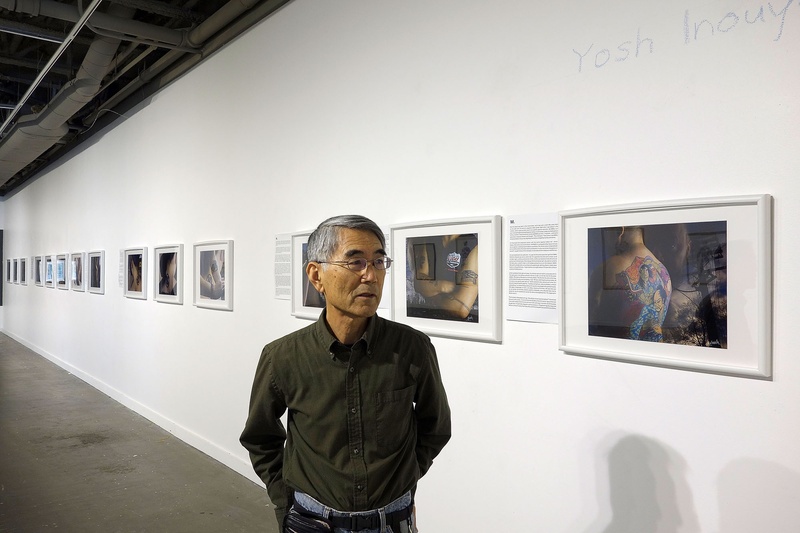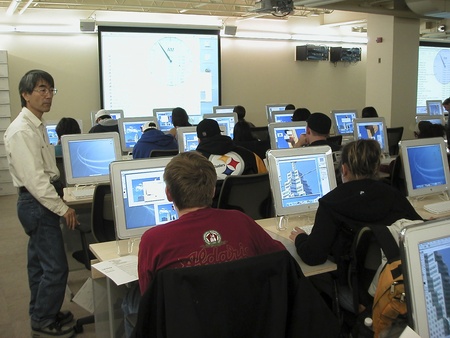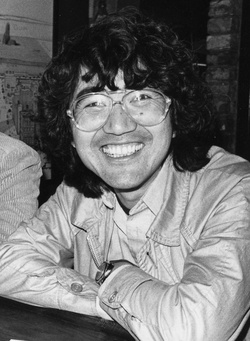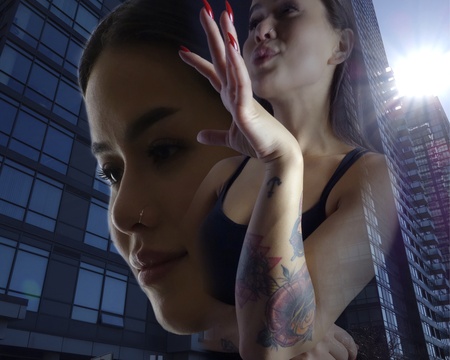Can you talk a bit about your families here?
I married three times and broke up three times. I have six sons. I am very reproductive. I shouldn’t have left Japan. You know Japan’s birth rate is critically low. They need me!
I already talked about my three sons in Japan. So, my three other sons here: one graduated from McMaster University in Hamilton last year. He’s an ambitious boy, Jeremy, not knowing his limit yet. He has an appetite for learning about the internet. Another, Sean, is still at college trying to find his niche area in IT.
The other, Timothy, likes math and computer. He uses HTML coding instead of words. He doesn’t even remember his friends’ name. He lives in his own world. He is most like me.
Do they see themselves as “Nikkei” or “Hapa”? What is their mother’s ethnic background?
Jeremy’s mother is a Polish Canadian. He doesn’t speak Japanese, though he attended Saturday Japanese class for several years. I don’t think he sees himself Nikkei nor Hapa. He spent three months travelling alone in Europe. His cultural focus seems to be more on Europe than Asia.
Sean and Timothy’s mother is Ijusha. They speak fluent Japanese. They are more into Japanese culture.
Do they live in Canada? Do they identify themselves as “Nikkei”? What about their mother?
Yeah, they live in Canada. Do they identify themselves as “Nikkei”? Huh, I don’t know, I don’t think they see themselves as particularly “Nikkei.”
More Japanese then?
Yeah, more Japanese. They like Japanese Anime.
What kind of Canadians do they see themselves as?
Hum, Japanese kind? I don’t know.
“Japaneseness” seems to be more of a stumbling point for Japanese immigrants than immigrants from other cultures? What has been your experience?
Japaneseness? Maybe, due to lack of an “international sense,” living on an island, talking a language no other people use. Yes, this language barrier is the biggest obstacle to new Ijusha.
Another area is lack of their own personal opinions. Japanese society has a strong vertical hierarchy on top of the “oneness.” From kindergarten to university, the emphasis is on the listening/following not establishing ones own opinion. As a result, Japanese immigrants tend to withhold themselves. This does not help them to learn a new language.
In my case? I worked very hard to learn English, especially conversational, while I was at university. By the time I landed on Canada, I was already speaking English. This truly made a huge difference, I could start my own business in three years because of my language not only photography skills. I could also teach at college because of my English.
Also, because of the language, I could make friends among Sansei and other Canadians, and learnt Canadian way of life/thinking quickly. I may also have lost my ‘Japanese attitude’ quickly. For example, I was criticized that I use “I” too often in conversation when I visited Japan.
What does being Ijusha mean to you? How well do you relate to other Ijusha here in Canada?
One third of my friends is Ijusha, another third is Nikkei, the rest is others. On being among Ijusha, I always find myself behaving with caution. Japanese have a strongsense of sameness. Japanese make friends among people of the same sense of value. If I show a different value, I will not be welcomed.
Can you describe that “sameness” with some more detail?
You have to have the same value sense and talk only what other want to hear in Japan. You must constantly reassure them that you are one of them in order to stay in the group. If you are ‘left wing’, you have to share the same opinion as other left wingers. Japan is also a society of surface not the contents. Few talk from heart. They don’t want to hear any negative things, even if it is important.
Why don’t they want to hear negative things?
They like to avoid disagreement at any cost. Accord is paramount. Negative opinion tends to bring on arguments, so they are sensitive to negative expression unless it is well accepted opinion like negating Constitution changes. They like to think and act in a ‘flock’, not as ‘individuals’.
So, the Ijusha don’t see themselves as members of the “Nikkei” community? How is the Ijusha different from ‘Nikkei’?
Well I don’t want to throw a big net to cover all Ijusha. A number of Ijusha do see themselves as Nikkei.
I now have started seeing myself Nikkei. When I was actively working, I didn’t see myself as Nikkei. I was too busy making a living. After retirement and frequent visiting the Japanese Canadian Cultural Centre (JCCC) as a volunteer made me feel as Nikkei as I was accepted among them.
We are pack animals, we need to belong to a group which welcome us and feel at home. The JCCC is a great place for Ijusha to come and meet other alike and eventually they will find their own group. Here the language will be the biggest barrier.
The Nikkei community itself is changing rapidly.
How so? What changes have you seen?
When we say “Nikkei,” we automatically think prewar immigrants and their descendants. The Sansei’s interracial marriage rate is over 90 percent. When you meet Yonsei you often don’t recognize them as “Nikkei”.
The majority of new Ijusha of last 20 years are female. Most of their marriage are interracial. If you visit Japanese language schools in Toronto, you have to work hard to find out a Japanese surname. We are not what we used to be.
How might that Ijusha community be different from the one that immigrated here before World War Two? What are the intersection points between the two?
People who came before the war experienced much harder life, discrimination and internment, than post war immigrants. I didn’t even know Nikkei history while I was in Japan. It is never told in Japan.
Now I involved myself [with the] “Nikkei Archive” at the JCCC. I have learnt so much of Nikkei history. As a result, I feel myself much closer to Nikkei than new young Japanese immigrants. I feel very comfortable among Nikkei. I sense when I am comfortable being among Nikkei, they feel comfortable with me. The JCCC became a big space in my life.
We have to learn history of each other. Not knowing each other’s background deters one groups from understanding the other.
How well do they understand each other? Is there anything about one or the other group that they are misunderstanding?
Even among Ijusha, our older Ijusha are vast different from new younger Ijusha.
Older Ijusha are mostly went through the rigorous screening of immigration, based on the education, skill, and the language. The majority of recent young immigrants came here with a working holiday visa or student visa and found the spouse, then became immigrants without needing other survival skills in Canada.
Personally, I cross bridges relatively easily between the generations: Nisei, Sansei, Yonsei. I feel most comfortable among Sansei than new younger Ijusha due to our similar age. New young Ijusha are foreigners to me. It is due to the difference of background. New Ijusha grew up while Japan was at the top economical era, while I grew up during and right after the War.
How does this affect their place in Canada? How do we build a Nikkei/Japanese Canadian community that includes Ijusha?
You should ask a sociologist these questions. I flunked sociology.
Vancouver Tonarigumi is doing quite well mixing Nikkei and Ijusha. We have a lot to learn from them. Some Ijusha are active visiting the Momiji (Seniors Home in Toronto). I was asked to help at a Momiji concert of Ijusha. There were no Nikkei in the group.
The Japanese Social Services (JSS) is working hard with Ijusha. Some Sansei are involved with them. This is a good one.
The majority of Ijusha send their children to Japanese schools. We can work with the schools and have some of their activities at the Toronto JCCC. We have a number of events which draw a good chunk of new Ijusha to JCCC. The JCCC is the centre as it is named.
I like to wait until they get older. They will become a good part of the Nikkei community when they have no other place to go. Now, they are too busy chasing Pokemon!
You are retired now and have chosen to stay in Toronto. How are you spending your retirement? Why not return to Japan?
Yes, I am happily retired, and love living in Toronto. I mean it. I really enjoy living here. Toronto is a wonderful city. I go to the JCCC a few times a week. I volunteer at “Discover Japan”, “Archive”, “Event Photography”, etc. I also attend Japan Foundation events, Munk School of Global Affairs lectures, etc. I am making myself busy and staying out of trouble.
I made number of good friends here and they are the most precious in my life – FRIENDS. I can tell the friends how I feel honestly feel without fear of losing them or losing my face. I doubt that I can do the same in Japan.
How active are you as a photographer now? Any on going projects?
I have just finished my exhibition of “Tattoo” at the JCCC. I have an ongoing theme of urban life. It may take a little while for that project to materialize.
Any final words? Hopes?
I made a lot of mistakes, and had a few success in my life. Those mistakes became sweet memories. If I didn’t take risks I wouldn’t have made mistakes, then, I am sure, I would deeply regret not having done those things!
Can I say more? There is no right or wrong. Better not live with sense of right or wrong, live with your own preferences. Is this too hard to understand? Remember, you are the centre of the universe. Be your own person.
* “Yosh Inouye Documentary”: This is a Film Arts student's project of Earl Haig Secondary School.
© 2016 Norm Ibuki










